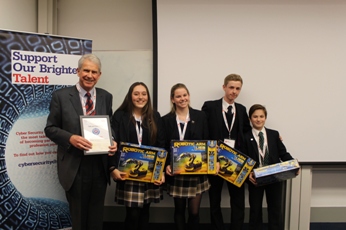Seven teams of the UK’s best 13-18 year old code-breakers from schools across the country will today compete in an ‘I, Robot’ style cyber competition to become the ultimate young cyber security defenders. The competition, created by industry giants and government organisations, will task amateur sleuths to intercept messages and infiltrate networks in order to defend the fictional ‘Cyber City’ from criminals.
The winning school team will receive a £500 prize from AFCEA (Armed Forces Communications and Electronics Association) Academic Trust which will go towards bolstering technology skills in their institution, as well as a range of cyber and educational rewards.
The final, dubbed Cyber Games, which will take place in the Department of Computer Science at the University of Warwick, is the culmination of months of online competitions and coding exercises, where teams designed and submitted their own ciphers, then played against each other to climb to the top of the scoreboard. The final seven are the highest scoring teams and comprise some of the most prodigious young cyber talent in the country today.
The ‘Cyber City’ is fictional city of the near future, where all aspects of the city are digitally integrated and accessible via the Internet of Things. The city is under threat from a mysterious group of criminals and the teams will have to race against time to repair damage, solve problems and investigate the perpetrators in order to save the city from destruction.
The 28 finalists will be challenged to demonstrate their code breaking skills in front of industry experts in a series of live timed tests which will test their technical skills under pressure. Importantly, a strong emphasis will be placed on teams to adhere to the strict ethical and legal checks that law enforcement must abide by, for example when setting up wiretaps. They will also be tasked to analyse rubbish left in a hotel room to socially engineer passwords to their computer systems; overpower attacks on robotic arms within energy facilities; protect defence barriers in the waterways to block their escape route and perform digital forensics on networks in order to block malicious attacks.
The Cyber Games competition forms part of the Cabinet Office backed Cyber Security Challenge UK schools programme, which provides bespoke teaching resources, designed by its sponsor consortium and partners, to help address the critical cyber security skills gap by sparking interest student interest in cyber security.
The games room have been created by some of the leading names in the cyber security industry including: National Grid, aeronautics specialist Airbus Group, defence giant Raytheon, national communications company BT, global IT trade association CompTIA, Birmingham City University, University of Warwick, GCHQ, the National Crime Agency and social engineering experts The Antisocial Engineer Ltd and Jenny Radcliffe Training.
Jason Stanton, Schools Programme Manager at the Cyber Security Challenge UK said: “There is a critical cyber security skills gap in the UK and in order to address this once and for all, we need to spark an interest in cyber security as a career at a young age. We work with our sponsor community to design fun, practical and realistic challenges that teach the core skills in an exciting way and can be delivered by any school in the country. Our aim is for the pupils to leave today feeling inspired and seriously considering a career in cyber. By offering a pathway to future employment, this helps prevent gifted children drifting into cyber-crime, providing a positive outlet for their talents.”








